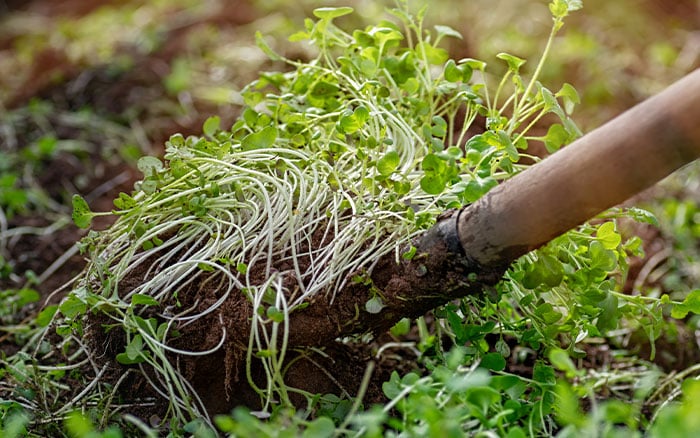It’s August and harvesting all the ripening crops in the veg garden is not only in full swing, but also starting to reach its peak. So once crops have been harvested, sow ‘green manure’ to enhance the soil quality to prepare it for next growing season.
When harvesting, you’re probably occupied with finding different ways to eat and preserve the wonderful quantity of fresh veg. But do also spare a thought for the soil left empty after harvest is complete.
It’s not ideal to keep soil uncovered for any length of time, especially over winter. The main reason being is that wind and rain can wash away all that nutrient rich top level of soil. Also, if left uncovered, weeds can soon germinate and grow quickly even during the depths of winter.
One of the best ways to help keep soil weed free and full of goodness is to sow what’s known as ‘green manures.’ These are fast growing crops that for various reasons, enhance the soil quality, as well as keeping it covered over winter.
Just a case of sprinkling seeds of your choice over the vacant soil, raking level and then allowing the seeds to germinate and grow. These can then either be pulled up or dug into the soil the following spring.
Most garden centres and plant nurseries keep a stock of the various types of green manure on display, with the best times of the year to sow them displayed on the packet.

Green manures to grow
Grazing rye and Italian rye grass
These are a good choice if you have difficult soil to cultivate, whether it’s heavy clay or light and sandy. They grow well on most types of soil, helping to keep them protected and weed-free over winter.
Their roots help open the tiny soil particles of heavy clay soil which improves drainage.
Seeds of both can be sown from now until early November; just make sure to dig out the whole crop two months before you need to sow plants in the soil. Also, be aware that if the roots are left too long, they can be difficult to dig out.
Phacelia
This is another choice that’s easy to grow and remove from most soils. In addition, there’s the bonus of producing very beautiful bright blue flowers which pollinators love. They can be sown from any time between early spring to late summer.
No dig
Don’t worry if you are practising a ‘no dig’ growing regime. Instead of digging in plant roots at the end of the overwintering period, simply cut them down level with the soil surface and leaves the foliage on the soil surface to rot down. You could also plant through this layer, treating the green manure crop like a mulch. Alternatively, if you want to sow seeds, just move it to the edges of the borders or remove and compost.


Leave A Comment